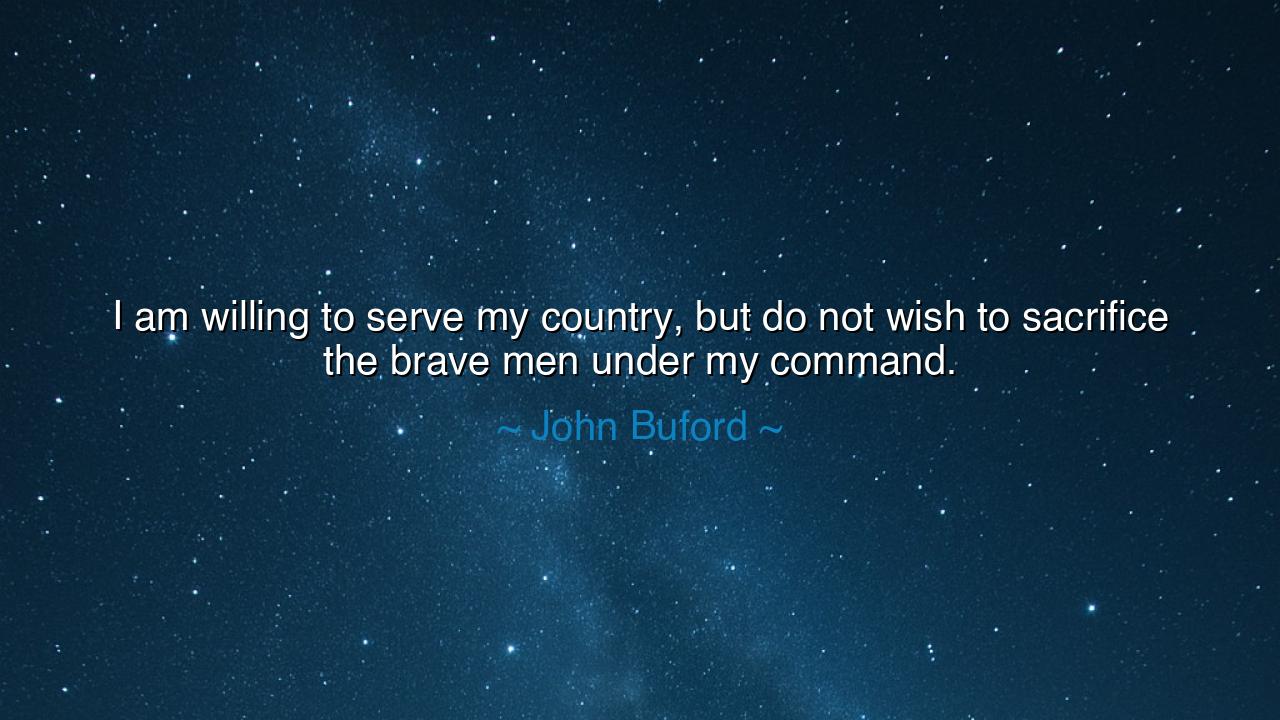
I am willing to serve my country, but do not wish to sacrifice
I am willing to serve my country, but do not wish to sacrifice the brave men under my command.






“I am willing to serve my country, but do not wish to sacrifice the brave men under my command.” These are the words of General John Buford, a Union cavalry officer of the American Civil War, whose wisdom and courage burned bright in the midst of chaos. In this saying lies the heart of a true leader: the willingness to give all for one’s nation, yet the refusal to spend the lives of one’s soldiers recklessly. For Buford understood that service is noble, but sacrifice must never be wasteful.
The meaning of this declaration reaches deep into the essence of leadership. Many will speak of serving their country, but few truly weigh the cost upon those they lead. Buford, however, looked upon his soldiers not as faceless instruments of war, but as men of flesh and blood, as fathers, sons, and brothers. His patriotism demanded that he fight, yet his humanity demanded that he preserve the lives entrusted to him. In this balance between duty and compassion, he reveals the rare greatness of a commander who serves both country and men.
The origin of these words is rooted in the fiery crucible of Gettysburg. On July 1, 1863, Buford’s cavalry was the first to engage Confederate forces advancing into the town. Outnumbered, his men stood firm, delaying the enemy long enough for Union reinforcements to arrive. Buford’s foresight and skill in choosing the high ground gave the Union Army the advantage it needed to prevail in the decisive battle of the war. Yet in all his maneuvers, his concern was always for the lives of his troopers—bravery demanded their stand, but wisdom demanded it not be squandered.
History has seen many who failed in this balance. Leaders who, in pursuit of glory or pride, cast away thousands of lives in reckless charges, turning courage into tragedy. Think of the Crimean War’s Charge of the Light Brigade, where soldiers rode into slaughter because their leaders valued obedience more than human life. Buford’s words stand as a rebuke to such folly: to lead men into death without purpose is not heroism, but betrayal.
From his example, we learn a vital lesson: true patriotism is not blind zeal, but wise stewardship. To serve one’s country is a sacred duty, but to preserve the lives of those who serve with you is equally sacred. Buford’s creed calls us to reject the false glory of wasteful sacrifice and to embrace instead the higher glory of thoughtful, courageous leadership. A nation is not made strong by squandering lives, but by honoring them.
The wisdom of Buford reaches beyond the battlefield into every realm of life. Leaders in families, in communities, in nations, and in workplaces must learn the same truth: authority is not license to exploit, but responsibility to protect. To demand service without care for the well-being of those under you is tyranny; to serve while shielding them from needless harm is greatness.
Practically, this means that each of us, in whatever place of leadership we are given, must weigh carefully the cost of our decisions upon others. Do not recklessly use the energy, time, or lives of those entrusted to you for selfish ambition. Lead with courage, yes—but also with wisdom and compassion. Honor the people under your care as much as you honor the cause you serve.
Thus, let Buford’s words endure as a guiding fire: “I am willing to serve my country, but do not wish to sacrifice the brave men under my command.” Let every leader remember that service to country—or to any cause—is made noble only when joined with reverence for the lives of those who follow. For the true measure of a commander is not only the battles he wins, but the men he preserves. And the nation that raises up such leaders will endure, strong and unbroken, through every trial.






AAdministratorAdministrator
Welcome, honored guests. Please leave a comment, we will respond soon